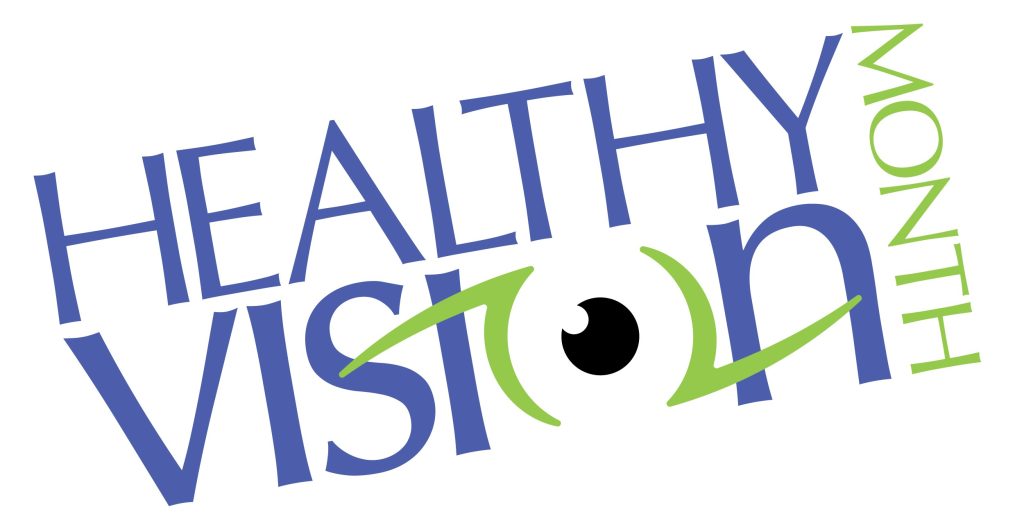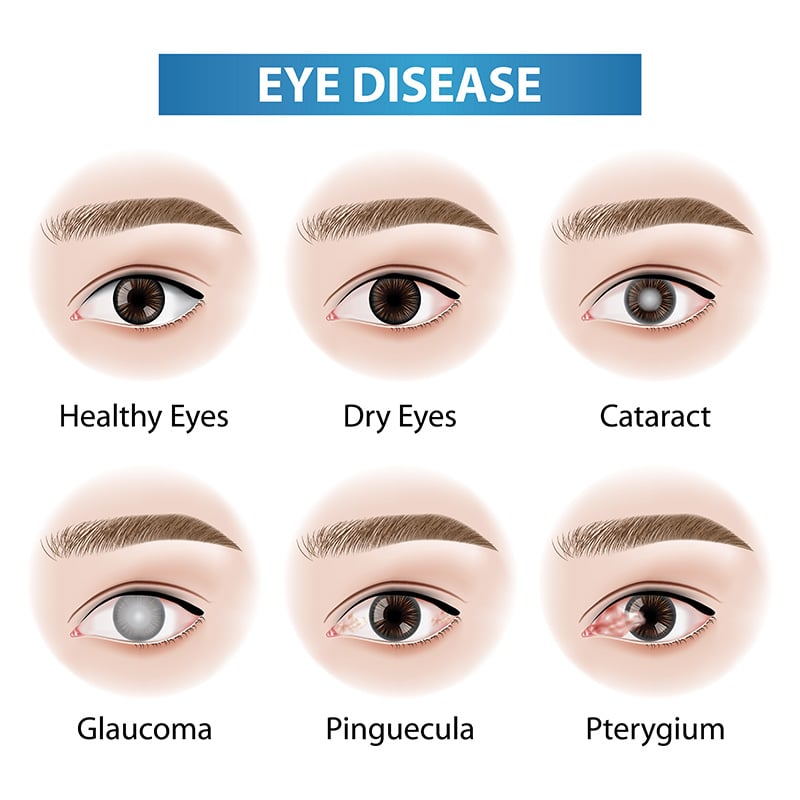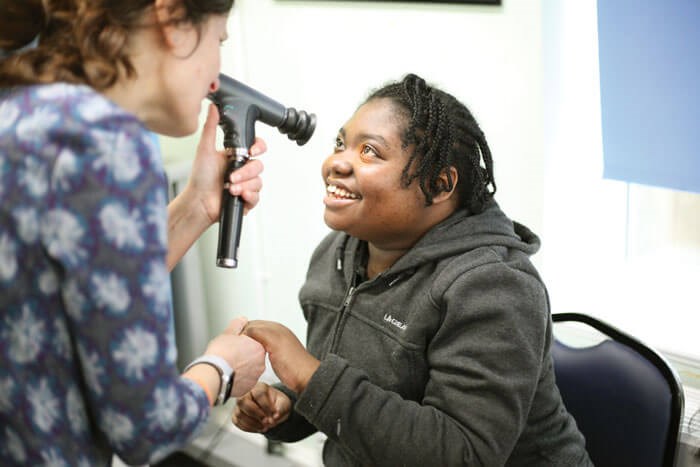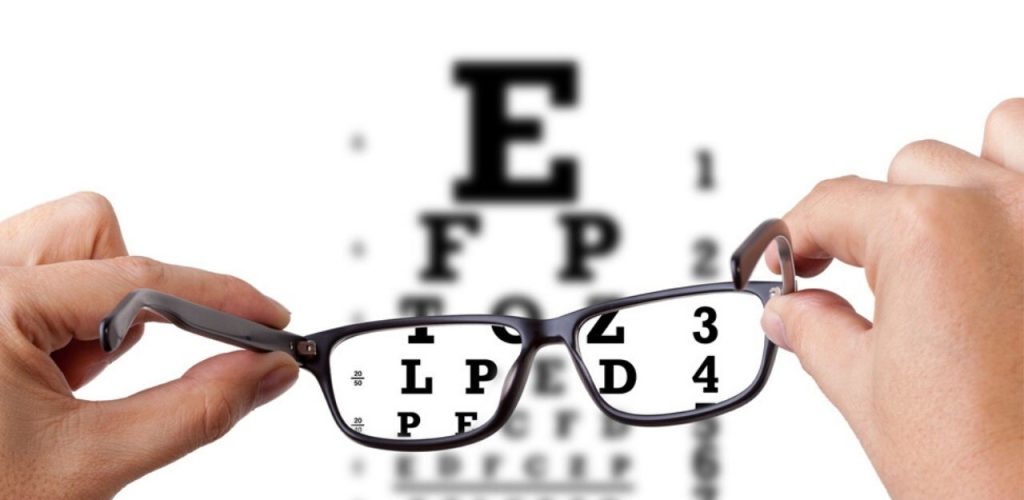
“May is Healthy Vision Month. It is a great time to spread awareness of the most common eye diseases, their symptoms and means of prevention. However, of course it is important to maintain good eye health habits throughout the year.
Healthy Vision Month raises awareness for the most common eye diseases affecting vision, including macular degeneration, cataracts, diabetic retinopathy and glaucoma. According to the American Academy of Ophthalmology, over 37 million adults in the United States suffer from one of these diseases. Many of those affected experience vision loss and even blindness. However, recent studies show that making healthy choices and getting regular eye exams can help reduce a person’s risk of vision loss. During Healthy Vision Month, we encourage everyone to learn more about these eye diseases, their effects and how to reduce the chances of vision loss through good eye health practices.” [1]
What are the most common eye diseases?
“The most common eye diseases worldwide are:
- Cataracts.
- Refractive errors like astigmatism, farsightedness (hyperopia), nearsightedness (myopia), and age-related loss of up-close focusing (presbyopia).
- Glaucoma.
- Age-related macular degeneration.
- Diabetes-related retinopathy.
- Eye injuries are also a leading cause of vision loss and blindness. Experts track and research them like diseases to find better ways to prevent and treat eye injuries.
- Eye cancers and tumors, while rare, do sometimes happen, but often they’re detectable with regular eye exams. Fortunately, many eye tumors are benign (noncancerous). These benign growths may still need removal to prevent them from affecting nearby tissues but aren’t a greater threat.” [6]

How are eye diseases treated?
“Eye disease treatments can vary even more than the conditions they treat. Some treatments can help with many conditions. Others are very specific, meaning they won’t help with anything but the conditions they’re meant to treat.
Refractive errors are some of the most common eye conditions. They’re also usually easier to treat, with corrective lenses like eyeglasses or contact lenses helping to adjust eyesight and improve visual acuity.
Other common treatments for eye conditions include:
- Vision correction surgery, especially laser-based surgeries like LASIK.
- Eye surgeries like glaucoma surgery and cataract surgery.
- Medications.
Because the treatments can vary so widely and be so specific, your eye care specialist is the best source of information about treatments for your specific needs. They can also tell you about possible side effects, complications and more.” [6]

What are a few steps people can take to protect their vision?
“With proactive care and adopting certain lifestyle habits, many common eye conditions can be prevented, delayed, or managed more effectively. Here are essential best practices for preserving your sight:
- Routine Eye Examinations
- Protective Eyewear
- Nutrition and Hydration
- Screen Time Management
- Avoid Smoking
- Consistent Sleep and Exercise
- Stress Management
The exact relationship between stress and glaucoma is complex and not fully understood. A recent study suggests that in patients with glaucoma, there may be benefits to eye pressure and optic nerve health by doing mindfulness meditation on a regular basis.” [3]
How important are eye exams for adults with developmental disabilities?
“As we age, our eyesight changes. Most of these changes are normal, age-related changes that do not present a serious threat to one’s well-being. However, as we live longer, more and more people will experience a significant impairment of their vision that will hinder their ability to function independently on a daily basis. It is very important that older adults see an eye care specialist on a regular basis since many causes of vision impairment are treatable and vision loss can often be prevented.
Also, a change in a person’s behavior resulting from an undiagnosed vision problem could be mistaken for another serious problem, e.g., Alzheimer’s Disease. Accurate diagnosis and treatment are critical for the person’s well-being as he ages.” [4]

If an adult with a developmental disability does not read or do any close work using her eyes, is an eye exam still necessary?
“Yes, an eye exam will detect if the individual has an eye disease. Many treatable causes of vision loss are never apparent to someone looking from the outside, without the aid of special instruments. If left untreated, eye diseases can cause blindness or severe impairment which can interfere with an individual’s safety in walking, the ability to understand what is expected of her, or the enjoyment of her surroundings.” [4]
Recognizing the unique healthcare needs of patients with IDDs
“It is vital to remember that each person with a disability is a unique human being, and it is impossible to generalize or universalize each person’s needs or characteristics. They are not defined by their disabilities, and they deserve a comprehensive eye exam to meet their visual needs.
Terminology about disabilities continues to be an evolving topic. Some patients and their families may identify with the term “disability,” while others may see themselves as “differently-abled.” The provider should follow their lead in referring to their abilities.” [5]

Conclusion:
“During Healthy Vision Month, let’s commit to prioritizing our eye health and spreading awareness within our communities. By incorporating these tips into our daily lives, supported by facts from the American Academy of Ophthalmology, we can take proactive steps towards maintaining optimal vision for years to come. Remember, your eyesight is irreplaceable—let’s cherish it and protect it every day.” [7]
Resources
[1] https://www.visionworks.com/articles-healthy-vision-month
[2] https://www.clarksoneyecare.com/eye-care-resources/healthy-vision-month
[3] https://glaucoma.org/articles/make-your-vision-last-a-lifetime-healthy-vision-month
[4] https://disabilitynavigator.org/article/12513/aging-developmental-disabilities-changes-vision
[5] https://eyesoneyecare.com/resources/best-eye-exam-practices-for-patients-with-idds/
[6] https://my.clevelandclinic.org/health/diseases/eye-diseases
